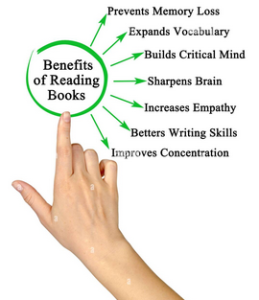Reading books offers a wide range of benefits that contribute to intellectual, emotional, and social well-being. This study focuses on some of the key advantages and benefits associated with reading:

The Benefits Associated with Reading Books
Table of Contents
ToggleCognitive Benefits:
- Knowledge Acquisition:
- Reading exposes individuals to a wealth of information, allowing them to acquire knowledge on a diverse range of topics, from history and science to art and literature.
- Improved Vocabulary:
- Regular reading enhances language skills, enriching vocabulary and improving language fluency. Exposure to a variety of words and phrases contributes to effective communication.
- Enhanced Critical Thinking:
- Reading stimulates critical thinking and analytical skills. Engaging with complex narratives and ideas encourages readers to analyze, question, and form their own opinions.
- Cognitive Stimulation:
- Reading exercises the brain, keeping it active and engaged. It has been associated with a lower risk of cognitive decline and conditions like Alzheimer‘s disease.
- Problem-Solving Skills:
- Fictional stories often present characters facing challenges and conflicts, allowing readers to vicariously experience problem-solving and decision-making processes.
Emotional and Mental Health Benefits:
- Stress Reduction:
- Reading can be a form of escapism, providing a temporary break from the stresses of daily life. Engaging with a captivating book can promote relaxation and reduce stress levels.
- Empathy Development:
- Fictional narratives, in particular, enable readers to empathize with characters from diverse backgrounds and experiences. This promotes a greater understanding of others’ perspectives and emotions.
- Increased Emotional Intelligence:
- Exposure to different characters and their emotions fosters emotional intelligence, helping individuals navigate and understand their own feelings as well as the emotions of others.
- Mindfulness and Focus:
- Reading requires concentration and focus, promoting mindfulness. It encourages individuals to be present in the moment and fully engaged with the material.
- Improved Sleep:
- Establishing a pre-sleep reading routine has been linked to improved sleep quality. Reading can be a relaxing activity that helps individuals unwind before bedtime.
Social and Cultural Benefits:
- Connection to Others:
- Shared reading experiences, such as joining book clubs or discussing books with friends and family, can foster a sense of connection and community.
- Cultural Awareness:
- Reading exposes individuals to different cultures, traditions, and perspectives. It broadens cultural awareness and promotes a more inclusive worldview.
- Enhanced Communication Skills:
- Regular reading contributes to better communication skills, including improved vocabulary, comprehension, and the ability to articulate thoughts and ideas effectively.
- Lifelong Learning:
- Cultivating a habit of reading encourages a lifelong love of learning. It instills a curiosity that extends beyond formal education.
Entertainment and Enjoyment:
- Entertainment Value:
- Books provide entertainment and enjoyment, offering a wide array of genres and styles to suit individual preferences. Whether through fiction, non-fiction, or poetry, there is a book for every taste.
- Creativity and Imagination:
- Fictional storytelling encourages creativity and stimulates the imagination. Readers can visualize scenes, characters, and settings, fostering creative thinking.
In conclusion, the benefits of reading extend beyond intellectual growth to encompass emotional well-being, social connection, and personal enrichment. Cultivating a habit of reading, whether through fiction or non-fiction, can contribute to a more fulfilling and enriched life.
